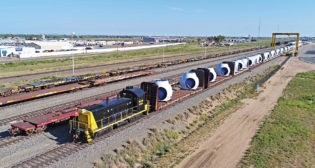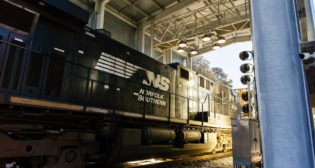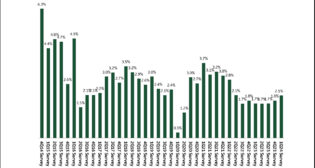
Trinity: Strong 1Q2019 growth
Written by Andrew Corselli
Trinity Industries on April 25 announced its first-quarter 2019 earnings results, which “show a strong improvement and continued growth of the owned/leased railcar portfolio, progress toward its goal of balance sheet optimization and a continued focus of returning capital to shareholders.”
Trinity reported quarterly earnings from continuing operations per common diluted share of $0.24, a 167% increase year-over-year. It also had quarterly revenues from leasing and management services of $187.1 million with a 41.2% operating profit margin.
In addition, the Leasing Group, which reported lease fleet utilization of 98.4%, grew the wholly and partially owned lease fleet to 101,005 units, bringing the total net book value of the lease fleet—before deferred profit—to $7.2 billion. The Rail Products Group posted quarterly revenues of $603.6 million, an 8.4% operating profit margin, a total railcar backlog of $3.3 billion, and quarterly railcar orders and deliveries of 3,000 and 4,505, respectively.
Trinity repurchased approximately 3.5 million shares at a cost of $89 million, including the completion of the company’s previously announced $350 million accelerated share repurchase program; put a new $350 million share repurchase authorization in place for 2019-2020; increased the quarterly dividend to $0.17 per common share, an increase of 31%; and successfully executed a $528.3 million secured railcar financing transaction subsequent to quarter-end.
“Trinity is off to a good start in 2019 with significant improvement in year-over-year earnings per share and quarterly revenue growth across our business segments,” said Timothy R. Wallace, CEO, President, Trinity. “We are making great progress in enhancing shareholder value. I am pleased with the level of capital the company has recently returned to shareholders.
“Trinity’s businesses performed well during the quarter. Currently, the general sense of economic uncertainty within our commercial markets shows signs of improvement. Our leasing business maintained a strong level of utilization, increased its operating margin during the quarter, and grew its wholly and partially owned lease fleet by 9% year-over-year. During the first quarter, our Rail Products team changed over a number of production lines while delivering a higher operating margin relative to the fourth quarter. The highway products business had a good first quarter despite several severe weather-related events that affected the timing of a number of highway construction projects. Overall, we continue to expect earnings growth of approximately 60-90% year-over-year for 2019. I continue to be very excited about focusing our resources on growing and improving TrinityRail’s integrated platform of products and services, as well as the strength and enthusiasm I see within our organization.”
Yet, Trinity Industries shares fell more than 9% on April 25 “despite the company reporting first-quarter earnings that came in ahead of estimates, with investors more focused on a revenue miss and tepid guidance for the full year than on the strong earnings number,” said Motley Fool analyst Lou Whiteman. “Trinity reported first-quarter earnings of $0.24 per share on revenue of $604.8 million. The earnings number was a solid beat of the $0.20-per-share consensus, but the sales were below the $674.9 million in revenue analysts had expected. The company said it expects to earn between $1.15 and $1.35 per share for the full year, placing the midpoint guidance, $1.25 per share, below the $1.31-per-share figure analysts were anticipating.
“The company also maintained prior guidance that it expects to produce between 23,500 and 25,500 railcars for the year. But investors could be cautious, because Trinity said it expects to hit that full-year earnings guidance in part thanks to a lower-than-expected tax rate and reduced corporate expenses.
“Trinity also removed from its backlog orders for about 3,050 railcars valued at $240 million because of ‘the financial condition’ of one of its leasing customers. The company did not identify the customer, though it seems likely it was an energy company. Trinity is in negotiations over compensation for the termination, and the company noted that all of the contracts removed from backlog were planned for delivery after 2019, so the move does not impact current-year guidance, but it could have raised concerns among investors.
“Shares of Trinity and other railcar builders tend to be volatile and trade in part based on sentiment about the overall health of the economy. The company’s stock lost 43.8% of its value in the fourth quarter of 2018, only to recover in 2019 prior to rival Greenbrier Companies’ forecasted weaker-than-expected first-quarter numbers.
“Trinity is a solid operator, and the downward plunge might end up looking like an overreaction in hindsight. But given the lingering concerns about potential trade wars and where we are in the economic cycle, coupled with rail-specific issues including a push by railroads to do more with less equipment, investors were unwilling to give Trinity the benefit of the doubt after a noisy quarter.”



